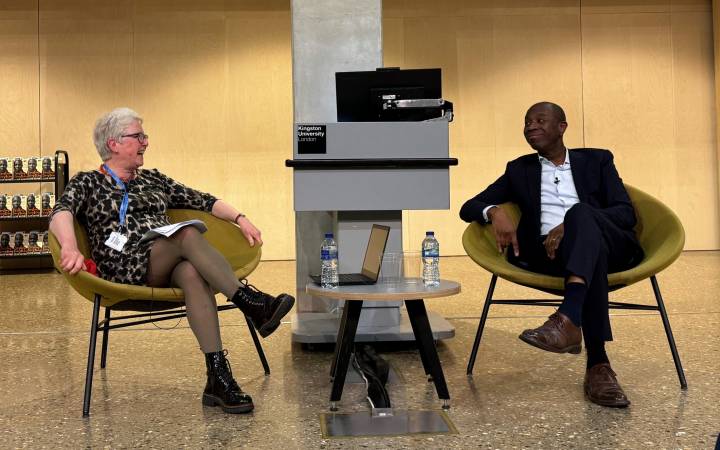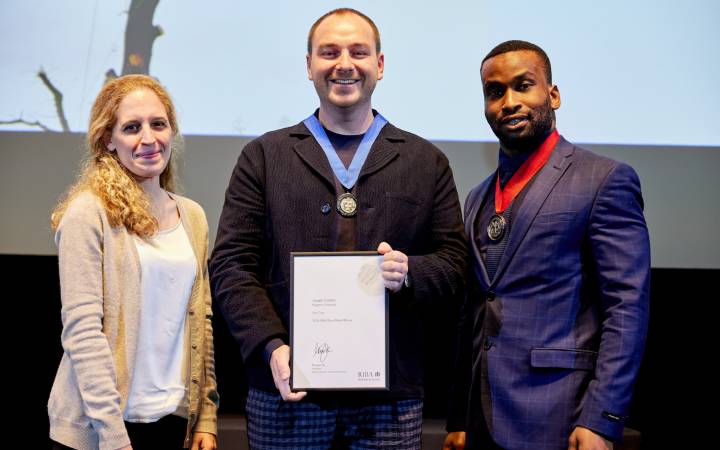Student turns waste woodchips in to sustainable fashion
Posted Wednesday 14 September 2011
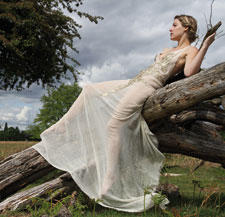 It's often said that one man's junk is another man's treasure - and that certainly seems to be the case for Kingston University London designer Stefanie Nieuwenhuyse. The MA fashion student has spent the past couple of months turning a fellow student's discarded woodchip off-cuts into a range of sophisticated womenswear, which will be unveiled during London Fashion Week.
It's often said that one man's junk is another man's treasure - and that certainly seems to be the case for Kingston University London designer Stefanie Nieuwenhuyse. The MA fashion student has spent the past couple of months turning a fellow student's discarded woodchip off-cuts into a range of sophisticated womenswear, which will be unveiled during London Fashion Week.
Stefanie and her Kingston fashion colleagues were set a challenge by bio-waste firm InCrops Enterprise Hub to show how sustainable materials could be used in fashion. "I saw some tiny diamond-shaped pieces of wood on the University workshop floor - I suspect they were window shapes cut out by an architecture student," the 24 year old originally from Amersfoort in Holland explained. "They created really eye-catching patterns on the ground so I scooped some up and took them home with me."
Stefanie realised the woodchip patterns had reminded her of a second-hand snakeskin bag she'd recently bought. The Dutch designer began to investigate whether she could recreate the look of the material's scaly surface using just her woodchip waste.
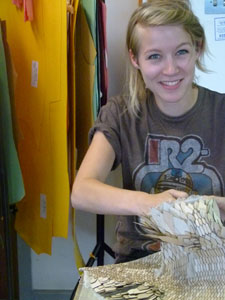 Stefanie experimented with patterns, gluing the tiny wooden diamonds on to organic, unbleached cotton, and stitching on larger shapes. "I wanted to see if I could mimic the look and feel of reptile skin, so I copied the natural patterns. I wanted to try to create an eco-friendly alternative to this high-end fabric," she said. Using discarded pieces of plywood she found on campus, Stefanie created her scale-like shapes as efficiently as possible using a laser cutter. She painstakingly attached them to the cotton fabric by hand, each shape slightly overlapping to create a durable surface with fluid movement.
Stefanie experimented with patterns, gluing the tiny wooden diamonds on to organic, unbleached cotton, and stitching on larger shapes. "I wanted to see if I could mimic the look and feel of reptile skin, so I copied the natural patterns. I wanted to try to create an eco-friendly alternative to this high-end fabric," she said. Using discarded pieces of plywood she found on campus, Stefanie created her scale-like shapes as efficiently as possible using a laser cutter. She painstakingly attached them to the cotton fabric by hand, each shape slightly overlapping to create a durable surface with fluid movement.
Her luxurious-looking collection in woody brown and beige includes a corset, a full-length dress, trousers, necklaces and a pair of shoes, all created without depleting any natural resources. She has even considering making a snakeskin-effect bag to replace her much-loved second hand purchase.
The young designer is keen to carve out a niche for herself in sustainable fashion. She presented her designs to InCrops' via Skype from her home in Holland. Liliya Serazetdinova, the company's Business Innovation Manager, was suitably impressed with what she had achieved.
"Stefanie's work stood out as she had combined using a very simple material, plywood, with modern laser cutting techniques to create a material that looked fabulous," Ms Serazetdinova explained. "I thought the standard of work from all the Kingston students was very high, but Stefanie's work was particularly mature. It was fascinating to see how she had married high-tech solutions with delicate handcrafting."
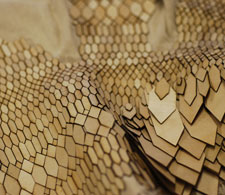 InCrops are planning to exhibit Stefanie's work, along with that of her fellow MA fashion colleagues, at a business networking event in London in November and are keen to see what possibilities can grow from her discovery.
InCrops are planning to exhibit Stefanie's work, along with that of her fellow MA fashion colleagues, at a business networking event in London in November and are keen to see what possibilities can grow from her discovery.
Kingston's MA Fashion course director Nancy Tilbury says ethical and sustainable production is becoming increasingly important in fashion. "We want our students to be at the forefront of thinking in this area," she explained. "Stefanie's interest in handmade clothing and her desire to find an antidote to today's throw-away culture have really come to the fore in this project. InCrops' interest in her work is a real testament to the quality of her designs."
Stefanie will unveil her latest collection during London Fashion week this month. Her work will form part of Kingston University's MA Fashion presentation at Vauxhall Fashion Scout in Freemasons' Hall, Covent Garden, on Friday 16 September.
- Find out more about studying MA Fashion at Kingston University.
Contact us
General enquiries:
Journalists only:
- Communications team
Tel: +44 (0)20 8417 3034
Email us

